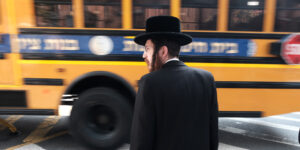He was a fat bloke with a swastika tattooed on his beer belly and a teardrop inked beneath his eye. Let’s call him the cartoon fascist. The Guardian describes another: “a Port Vale fan supping a can of Stella Artois.” There were several hundred of them on Saturday, boorishly shouting “En-ger-land” around the Cenotaph. Easy to spot, easy to despise. And I do.
But, in an upside-down kind of way, the far-Left loves these types, because it helps them re-assert a comforting narrative about who the bad guys are and who the good guys are — they themselves falling squarely into the latter category. When I grew up, being anti-fascist used to be all about confronting angry, skinhead racists — thugs who would beat up black and brown people on the streets and throw disgusting insults around. Even when they tried to assume a sort of respectability to win elections — an unconvincing camouflage of cheap shirt and tie — you could still smell the fascism on them. But they haven’t won an election in this country for years. We are not fooled. The BNP collapsed in 2010. Good riddance.
Such is the power of the cartoon fascist though, that he invites complacency; he allows “good people” to look in the mirror and believe they aren’t antisemitic. They chortle away at that Mitchell and Webb sketch of two SS officers asking “Are we the baddies?” thinking it refers to someone else.
These days, the fight against fascism has become a lot more complicated, more nuanced. And, because of this, more dangerous again. The war against Hamas has given people an alibi to say the most racist of things, and yet to retain all innocence in their own minds. And the more morally certain people are that they are right, the easier it is for them to miss their own complicity. During the month following the Hamas attack, the Community Security Trust reported the highest number of antisemitic incidents since they were formed in 1984 — a 531% increase from the same month last year. And I bet my bottom dollar that most of these incidents are not being conducted by, or even inspired by, Stella-fuelled cartoon fascists.
I was in synagogue on Saturday morning, having been asked to speak at their Service of Remembrance. The mood was sombre. We sang psalms, read from the Bible, opened the Ark to gaze on the gleaming Torah scrolls. Children said prayers, the Rabbi preached a beautiful sermon about the need to pray for those held hostage, those murdered — as well as for all those innocent Palestinians caught up in this horrendous war. In quiet dignity, many of us wept. The Last Post was played and we sang the British and the Israeli national anthems, back to back, many in the congregation proudly wearing their medals. “How much memory do you need?” a shop assistant asked me the other day as I was buying a new mobile phone. Here in the synagogue, memory is not units of data, but a way of speaking about who people are, where they have come from. Memory is not mere storage, it is existential; it is the stuff of life itself.
Security was understandably tight, a police car ready just round the corner throughout the service. Afterwards, several people told me that they have removed their mezuzah from the front door, no longer feeling that it is safe to give any public indication that they are Jews. And it wasn’t the beer-sipping Port Vale fan who was uppermost on their minds. At another London synagogue in St John’s Wood, Jews were abused as they left their place of worship. Cars flying Palestinian flags wound down their windows to shout insults and let off intimidating flares. A Jewish home in North London had red paint thrown all over it, designed to look like blood. On the “peace march” one Labour party member from Eastbourne carried a banner with a swastika entwined within a Star of David. Another chap wearing a keffiyeh over his face explained: “Hitler knew how to deal with these people.” Others thought it would be fun to cosplay with Hamas ensignia.
These are not what you might call “micro” aggressions. And hundreds of thousands marched through the centre of London many of them chanting “from the river to the sea” — which, however intended, amounts to a call for the eradication of Jews from Israel. October 7 shows what Jews face when they are not secure in their own land.
But drunk on their own righteousness — not Stella — even the most well-intentioned are often complacently Hamas adjacent, and literally so, marching alongside those who feel justified to use the most glaring of antisemitic tropes on their banners: Netanyahu with devil horns, a Jewish snake wrapped around the world, calls to “globalise the intifada”. I wonder how many of those who carry banners accusing Israel of being child murderers know that the blood libel was invented in this country in the 13th century with accusations that Jews murdered the children Hugh of Lincoln and William of Norwich and drank their blood. Can people really not see the connection? Of course there were good people on the march, but good people can also be the problem, providing cover for those who manifestly are not.
The antisemitism of the hard Right and the hard Left is easily spotted and readily damned. But it is the genteel, middle-class, soft-Left, hand-wringing antisemitism — the kind that wouldn’t dream of saying anything crass or extreme — that has been legitimised, has become high-status opinion even, on the streets of London. Do not think that your feel-good liberalism or soft leftism is any sort of prophylactic against your antisemitism. It isn’t.
Perhaps the most chilling thing I have ever read on the Holocaust was Christopher Browning’s Ordinary Men. First published in 1992, it tells the story of Reserve Police Battalion 101, a non-ideological group of Germans, many not Nazi party members, just ordinary people, who were persuaded to participate in the extermination of Jews simply from peer conformity and a deference to authority. As Browning challenges the reader in the final chapter, if people like these could end up murdering Jews, who among us could really be so confident that we would have acted differently? The reason we remember is, in part, to remind ourselves of the evil of which we are capable.
Disclaimer
Some of the posts we share are controversial and we do not necessarily agree with them in the whole extend. Sometimes we agree with the content or part of it but we do not agree with the narration or language. Nevertheless we find them somehow interesting, valuable and/or informative or we share them, because we strongly believe in freedom of speech, free press and journalism. We strongly encourage you to have a critical approach to all the content, do your own research and analysis to build your own opinion.
We would be glad to have your feedback.
Source: UnHerd Read the original article here: https://unherd.com/




